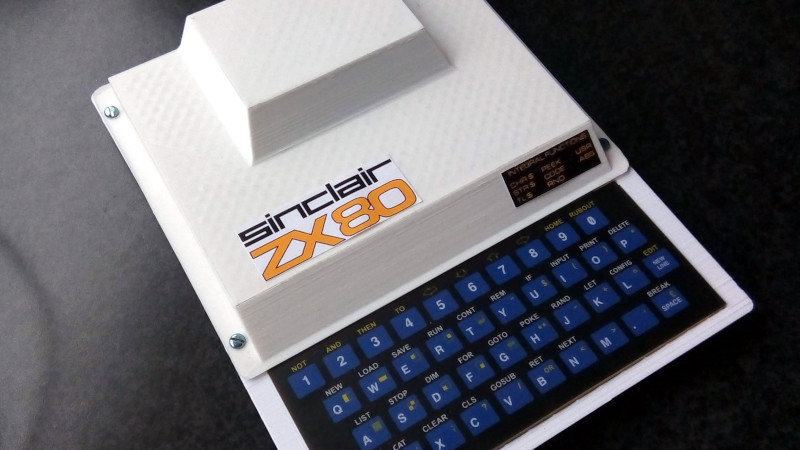A popular project among Hackaday readers is to recreate a piece of home computing or gaming hardware from the past, and in that endeavour we’ve seen some truly amazing projects. Usually they take the form of bare PCBs or custom cases that look nothing like the original, but not [Cees Meijer]’s Sinclair ZX80 clone. It sports a 3D printed replica of the original computer’s vacuum-formed case, which from a distance you could be mistake for the real thing.
Internally it’s not a ZX80 at all, but a Raspberry Pi Zero running an emulator. But with a case like this one that’s not the point. It doesn’t have the full-length PCB of the original but a modern ZX80 membrane keyboard, and the Pi appears to be hiding somewhere in the “hump” used by the Astec UHF modulator on the original. There is more information in a blog post, and the model can be downloaded via Thingiverse. Handily, the files also include the original CAD file from RS DesignSpark, should you wish to modify it to your own tastes. If somebody could mate it with Tynemouth Software’s ZX80 kit then our cup would run over.
Of course, this isn’t the only retrocomputer for which a replacement case can be found.
















i hate membran keys, I must write a program on zx81. ach terrible!!!!!
To be congratulated, some effort put into re-creating the ZX-80 instead of the usual rip the insides out and glue a Raspberry Pi into an original case nonsense.
Cool but it would be better to have used one of the ZX-80 clones people have made.
If you brought out the IO to the connector that would also be really cool. I would like to see one that fixes the problems that the ZX-80/ZX-81/TS1000 all had. Maybe a better keyboard?
The fixed ZX-81 was called a Spectrum, and the “okay, a real, real keyboard” fix was the Spectrum “+”
And yet the Spectrum + had more or less the same horrible keyboard membrane as the ZX Spectrum.
Perversely, it always seemed to be the ‘y’ key that went first for me (having redefined keys for a game, making answering ‘yes’ to confirm an exercise in frustration)…
I had equally “good” rubber dome PC keyboards in the 90s… the era of the last of the good good ones still being a bit north of $100 or so and the “cheap” ones being $30 ish… wasn’t all that long before there were better $5 or $10 ones.
I had both a Spectrum 48K (with rubber keyboard) and a QL (which had the same keyboard as the Spectrum +), and I have to say that yes, the rubber keyboard was a hassle. But the QL keyboard was marvelous compared with a lot of current keyboards. My Asus Zenbook keyboard is clearly inferior to the QL/Spectrum+ and I talk with knowledge because I typed a lot of school homework in my QL and a lot of code in my Zenbook.
BTW: my old IBM keyboard also had a membrane under the mechanic keys.
That’s really neat – it brings back if lots of memories. I never owned one but remember seeing them advertised in various magazines and the rubber buttons may have been nasty to type on but that would have been part of the experience and if your going to replicate something to at least look like the original the dubious keypad needs to stay.
If one made all the improvements possible, upgrade the keypad upgrade the memory the processor give it USB C the next thing you’ll be running Catalina or win10 etc.
I thought it some what amusing the interface board looked bigger than the pi driving it all.
Here is another Z80 computer remake : The VZ200. Essentially the keyboard has been printed and running the VZ JEMU emulator.
https://github.com/cwahlmann/vz200-remake
If anyone has any VZ / Laser software, I’d love to hear from you! I’m trying to collect all VZ/Laser software for archival purposes.
Looks great! Needs only one more detail to perfect it: the go-faster stripes on top of the modulator hump!
I’ve found that rectilinear infill gives me better results than honeycomb when printing large flat surfaces.
It’s nearly two years later, and only now I noticed that my design was featured here ;-) It’s funny that such an article can be posted on Hackaday, and I don’t get a notification. That would have enabled me to add some comments when it was still relevant.
Z80’s are still relevant!
B^)
True ! They don’t seem to fade out….